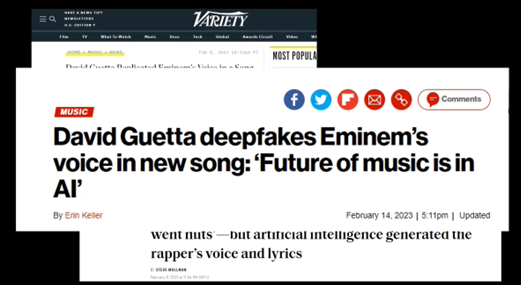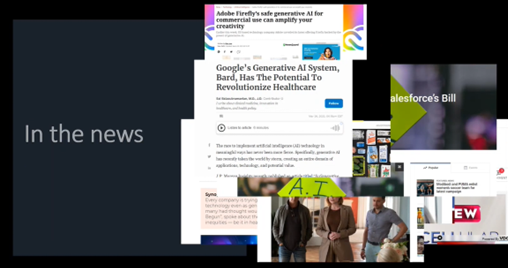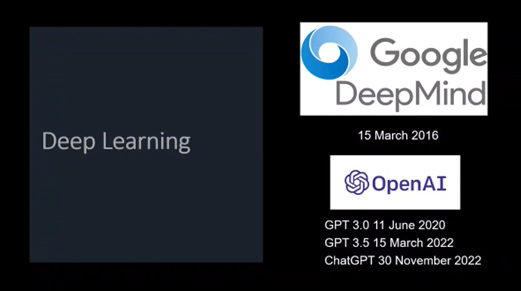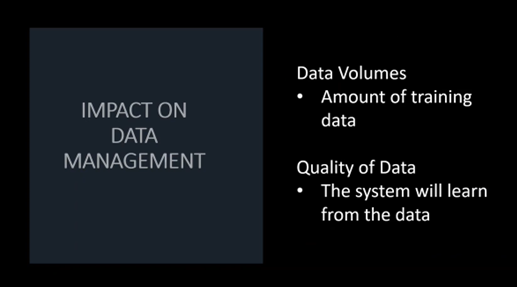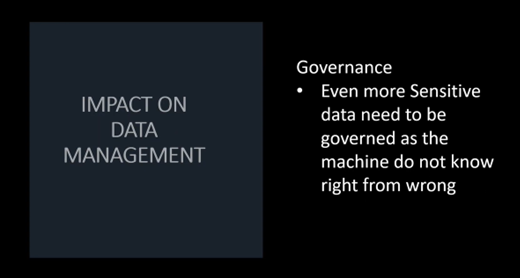Generative AI – The Big Change in Data Management
Executive Summary
Latest developments in Generative AI, Deep Learning, and its impact on various industries. OpenAI's plans for updating information in chat GPT. Overview of AI-generated images and its ethical implications. Concerns regarding compliance management and governance in relation to AI-generated content. Implementing ethical practices in machine learning systems.
Webinar Details
Title: GENERATIVE AI – THE BIG CHANGE IN DATA MANAGEMENT
Date: 24 April 2023
Presenter: Karin Olivier
Meetup Group: Big Data and Data Science
Write-up Author: Howard Diesel
LinkedIn Post: The Big Change in Data Management - Generative AI | LinkedIn
Contents
Introduction to Generative AI
Latest Developments in Generative AI and its Impact on Various Industries.
Open AI's Plans for Updating Information in Chat GPT.
Deep Learning and Alphago's Success.
The AI triumph over the world champion in the game of Go and the role of data analytics in the Tour de France.
Deep Learning and AI-Generated Images.
Overview of Deep Learning and its Applications.
GPT (OpenAI's AI Model) and Deep Learning.
Impact of Assisted Learning and AI on Data Management
Impacts on Data Management in the Age of the Internet
The Ethical Implications and Impact of AI on Sensitive Data and Marketing Industry.
Concerns regarding Compliance management and Governance in relation to AI-generated Content
Data Protection and Information Sources.
Governance and Data Quality Concerns.
Psychological Bias and Data Governance in Machine Learning.
Implementing Ethical Practices in Machine Learning Systems.
Compliance Challenges with Technology Advancements.
Importance of Whistleblowing, Social Licensing, and Ethics in Data Management and AI
Ethics in AI and its Implications.
Introduction to Generative AI
The utilisation of AI-generated Eminem vocals by David Guetta during a rave event has ignited a discourse concerning the role of AI in music. Karin expounds on the concept of generative AI and showcases her painting created by AI technology. The Chat GPT further elucidates the intricacies of generative AI, likening it to the imaginative capabilities of a child.
Figure 1 Introduction of Generative AI in the music industry
Figure 2 Example of Generative AI in image creation
Figure 3 Example of a Chat GPT conversation
Latest Developments in Generative AI and its Impact on Various Industries
Recent articles discuss generative AI's potential to amplify creativity and replace job functions like teaching. An experiment successfully generated a summary using ChatGPT chat and a team meeting transcription despite challenges with South African accents. Salesforth believes generative AI can revolutionise healthcare and image analysis. Bing's integration with generative AI is discussed, but its functionality and differences from Google are not fully understood.
Figure 4 Latest Developments in Generative AI and its Impact on Various Industries
Open AI's Plans for Updating Information in ChatGPT
The amount of information produced between 2021 and now is significant. However, the answers provided are outdated when researching or asking Chat GPT questions. Currently collaborating with Microsoft, Open AI plans to catch up with the latest information. The specifics of how they will achieve this are not disclosed. Open AI released GPT 3.5 for the public in 2022, and users can help the model learn by providing feedback through the thumbs-up button on the screen. Open AI and Microsoft are exploring ways to scan the internet and update the model with current data, but the details of their approach are currently withheld.
Figure 5 Open AI's Plans for Updating Information in ChatGPT
Deep Learning and AlphaGo’s Success
Deep learning, a major aspect of AI, was exemplified by AlphaGo’s 2016 success. A video of its unconventional move 37, with a one in ten thousand probability of being played by a human, was discussed by professional commentators and AlphaGo itself.
Figure 6 Deep Learning and AlphaGo’s Success
The AI triumph over the world champion in the game of Go and the role of data analytics in the Tour de France
The AI program AlphaGo surprised the audience by using an unconventional move that its human guide did not suggest. The commentators' confusion during the game highlights the impact of the machine's creative and different approach. Winning only one game, the world champion in Go, Lisa Doll, lost to AlphaGo in the best-of-five match.
NTT's data science and analytics team have contributed to the Tour de France by providing statistics and insights for the race's top 10 contenders. In the testing stages, an algorithm compared human opinions with data from previous races, demonstrating the power of learning from the past.
Deep Learning and AI-Generated Images
Karin discusses the use of deep learning in AlphaGo's move 37 and OpenAI's Ocean, which creates artistic images. She explains how deep learning algorithms can predict the next word in a sentence and the next pixel in an image. Karin acknowledges some oddities in AI-generated images and raises ethical questions about their potential copyrightability.
(request the recording to see the video)
Overview of Deep Learning and its Applications
Deep learning is a type of machine learning inspired by the human brain's structure. It allows machines to learn and improve task performance by training algorithms with data without human intervention. Neural networks, consisting of multiple layers of neurons and weighted channels that transfer information, are a key component of deep learning. Deep learning has applications in various fields, such as customer support, medical care, and self-driving cars. Still, it requires large volumes of training data, expensive computational power, and long training times.
ChatGPT (OpenAI's AI Model) and Deep Learning
ChatGPT (GPT3 - Generative Pre-training Transformer) is currently the world's largest and most complex neural network, boasting 17 billion parameters. Deep learning involves machines detecting and understanding things independently, without human guidance. Machines require data to learn, and the type of data determines their learning process. Understanding the intricacies of how deep learning works is not necessary to grasp its concept. ChatGPT's early learning was assisted by employing graduates.
Figure 7 Impact on Data Management
Impact of Assisted Learning and AI on Data Management
Assisted learning is a method of training a computer algorithm through data input. The algorithm makes predictions based on received data and adjusts them according to user feedback. Numerical algorithms are used to make predictions, and AI has impacted data management by creating customisable images. Concerns about job security related to AI and data management have been raised, but adaptability is key to ensuring job security in the changing landscape. Technological advancements, such as the evolution of education from limited access to widespread literacy, have impacted job security historically.
Impacts on Data Management in the Age of the Internet
The internet has significantly increased data volume, making efficient data storage and operations necessary. Accurate data is essential for machines to learn and make decisions, while garbage data can lead to ineffective outputs. Ethical considerations arise, as machines may make decisions affecting people's lives without human oversight. Governance and sensitive data are also important.
Figure 8 Impact on Data Management: Data Volumes and Quality
Figure 9 Impact on Data Management: Governance
The Ethical Implications and Impact of AI on the Sensitive Data and Marketing Industry
Machines lack ethical judgment, making it important to have sensitive data governance to prevent personal information from leaking to AI services. Compliance managers prevent sensitive data from entering the AI model, and automation of compliance management is being discussed as a potential solution to address bottlenecks in governance. The marketing industry is significantly impacted by AI generating language and incorporating images into presentations, with GPT4 being a paid version that can create visually appealing materials.
Concerns regarding compliance management and governance in relation to AI-generated content
AI technology may soon generate compliance packages based on regional laws. Governance concerns arise with AI-generated content, which may lack copyright knowledge. The organisation must consider who will enforce governance and control AI-generated content after publication. Azure can ringfence the internal data component for security. Open AR services require additional implementation for proper functionality.
Data Protection and Information Sources
An example is a coworker asking Siri about another coworker who has been off sick every Friday for the past four weeks. However, the accuracy of the information provided by Siri is not guaranteed, as there could be various reasons for the absences. It is recommended to use end device protection to prevent sensitive data from being copied or emailed, as data available on the internet (excluding educational articles) may not be governed and can be freely used. ChatGPT can gather information from the internet and present it in a conversational manner.
Governance and Data Quality Concerns
A Webinar participant suggests that educating people about the technology is more important than implementing more controls for governance. Existing controls already cover automated decision-making, and compliance can be monitored using tools like Azure or Microsoft 365. Mobile HR apps should be whitelisted, and compliance officers need training on digital skills. Data quality checks should include psychological bias and diverse perspectives for inclusive assisted learning.
Psychological Bias and Data Governance in Machine Learning
Karin acknowledges the need for compliance when dealing with Port 100 and suggests measures to address psychological bias. Howard highlights the prevalence of bias in GP's handling of certain questions and suggests investigating and selecting unbiased data sets in machine learning. He emphasises the importance of a feedback loop for questioning decisions made in the learning process.
Implementing Ethical Practices in Machine Learning Systems
The importance of incorporating human oversight and ethical considerations in sensitive areas like loan approvals can have a negative impact on communities. This includes validating input data from a buyer's perspective, monitoring and minimising error rates in predictive models, creating a feedback loop for users to improve the system, implementing ethical decision-making loops and protections, recognising and addressing biases, utilising ethical enterprise information management, incorporating digital persona feedback, and engaging stakeholders to assess error rates.
Compliance Challenges with Technology Advancements
Companies struggle with compliance awareness as technology advances, similar to the era of overlooked data management in spreadsheets. There is growing concern about the lack of understanding and responsible use of artificial intelligence. The community needs effective compliance solutions and workforce training. OpenAI GPT is an organisational data investment limited to Azure that requires integration or loading. Governance of data could be better enforced with the help of Google and AWS. Ethical considerations arise when using machines to address compliance issues.
Importance of Whistleblowing, Social Licensing, and Ethics in Data Management and AI
Whistleblowing is crucial to detect and address internal and external issues. Social license involves constant customer engagement for community approval. Data management requires accurate, high-quality data, seamless integration, optimised modelling, and secure storage. Generative AI demands adaptable data architecture and efficient resource utilisation. Privacy and governance are essential in managing sensitive information. Society and social ethics differ, highlighting the importance of ethics in AI. Entities like Facebook and YouTube should implement published ethics to ensure responsible and effective use.
Figure 10 Summary Statement
Ethics in AI and its Implications
The importance of agreed-upon ethics in the tech industry, including OpenAI's clause for shutting down potentially harmful services. The challenge of defining harm and ethical standards in multicultural project teams, and the influence of personal ethics and biases on AI. The potential benefits and drawbacks of biased AI models for different users, the psychological bias in test data, and the need for diverse perspectives in assisted learning.
LinkedIn Post: The Big Change in Data Management - Generative AI | LinkedIn
If you would like to join the discussion, please visit our community platform, the Data Professional Expedition.
Additionally, if you would like to be a guest speaker on a future webinar, kindly contact Debbie (social@modelwaresystems.com)
Don’t forget to join our exciting LinkedIn and Meetup data communities not to miss out!


